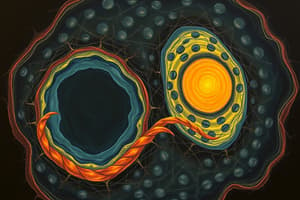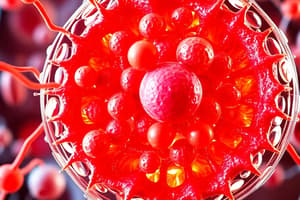Podcast
Questions and Answers
सभी जीवित जीवन जीवों से बनी होती है और कोशिकाएँ जीवन की मौलिक संरचनात्मक और कार्यात्मक इकाइयाँ होती हैं, यह ______ का सिद्धांत कहता है।
सभी जीवित जीवन जीवों से बनी होती है और कोशिकाएँ जीवन की मौलिक संरचनात्मक और कार्यात्मक इकाइयाँ होती हैं, यह ______ का सिद्धांत कहता है।
कोशिका सिद्धांत
पहली कोशिकाओं का पहला अवलोकन ______ द्वारा किया गया था।
पहली कोशिकाओं का पहला अवलोकन ______ द्वारा किया गया था।
रोबर्ट हुक
कोशिका सिद्धांत ने यथावत विकसित और विकसित हो गया है। कुछ आधुनिक व्याख्यानों में सम्मिलित हैं: * ** उपकोषिका सिद्धांत **: रोबर्ट हूक के मूल अवलोकन में कोशिकाओं में ______ शामिल नहीं था।
कोशिका सिद्धांत ने यथावत विकसित और विकसित हो गया है। कुछ आधुनिक व्याख्यानों में सम्मिलित हैं: * ** उपकोषिका सिद्धांत **: रोबर्ट हूक के मूल अवलोकन में कोशिकाओं में ______ शामिल नहीं था।
अंगनुकूलन
कोशिका सिद्धांत जीवन को एक सूक्ष्म स्तर पर समझने के लिए एक ______ प्रदान करता है।
कोशिका सिद्धांत जीवन को एक सूक्ष्म स्तर पर समझने के लिए एक ______ प्रदान करता है।
कोशिका विभाजन और वृद्धि**: कोशिका चक्र, जिसमें कोशिका विभाजन और वृद्धि शामिल है, आधुनिक कोशिका जीवविज्ञान का एक ______ है।
कोशिका विभाजन और वृद्धि**: कोशिका चक्र, जिसमें कोशिका विभाजन और वृद्धि शामिल है, आधुनिक कोशिका जीवविज्ञान का एक ______ है।
सेल संरचना विभिन्न होती है, फिर भी सभी सेलों में कई समान विशेषताएँ होती हैं। सेलों को सामान्यत: एक लचीला, अर्ध-पारदर्शी प्लाज्मा मेम्ब्रेन से घेरा जाता है जो सेल के अंदर और बाहर की वस्तुओं का पारगमन नियंत्रित करता है। भीतर, सेल ________ होता है, जिसमें आनुवांशिक जानकारी होती है, और विभिन्न अंगकोशिकाएँ होती हैं जो विशेष कार्य करती हैं, जैसे प्रकाश संश्लेषण के लिए क्लोरोप्लास्ट (पौधों में और कुछ श्वेतपदार्थों में) और ऊर्जा उत्पादन के लिए मिटोकांड्रिया।
सेल संरचना विभिन्न होती है, फिर भी सभी सेलों में कई समान विशेषताएँ होती हैं। सेलों को सामान्यत: एक लचीला, अर्ध-पारदर्शी प्लाज्मा मेम्ब्रेन से घेरा जाता है जो सेल के अंदर और बाहर की वस्तुओं का पारगमन नियंत्रित करता है। भीतर, सेल ________ होता है, जिसमें आनुवांशिक जानकारी होती है, और विभिन्न अंगकोशिकाएँ होती हैं जो विशेष कार्य करती हैं, जैसे प्रकाश संश्लेषण के लिए क्लोरोप्लास्ट (पौधों में और कुछ श्वेतपदार्थों में) और ऊर्जा उत्पादन के लिए मिटोकांड्रिया।
सेलों की विभिन्न ________ होती हैं, जैसे वृद्धि, प्रजनन, अनुदीप्ति, गति, संवेदनशील अनुभव, और संचार।
सेलों की विभिन्न ________ होती हैं, जैसे वृद्धि, प्रजनन, अनुदीप्ति, गति, संवेदनशील अनुभव, और संचार।
उदाहरण के लिए, ह्रदय की मांसपेशियों में सेल नियमित रूप से संकुचित होती हैं, जबकि त्वचा में सेल शरीर को बाह्य कारकों से संरक्षित करती हैं।
उदाहरण के लिए, ह्रदय की मांसपेशियों में सेल नियमित रूप से संकुचित होती हैं, जबकि त्वचा में सेल शरीर को बाह्य कारकों से संरक्षित करती हैं।
सेलें कोशिकाएँ बनाती हैं, जो जमा होकर अंगों को बनाती हैं, और अंगों को सामूहिकत: अंग को बनाने के लिए काम करते हैं, और अंग सिस्टम बनाने के लिए काम करते हैं।
सेलें कोशिकाएँ बनाती हैं, जो जमा होकर अंगों को बनाती हैं, और अंगों को सामूहिकत: अंग को बनाने के लिए काम करते हैं, और अंग सिस्टम बनाने के लिए काम करते हैं।
सेल सिस्टम का निर्माण करने के लिए अंग सामूहिकत: काम करते हैं, और अंग सिस्टम बनाने के लिए काम करते हैं। उदाहरण के लिए, ह्रदय की मांसपेशियों में ________ नियमित रूप से संकुचित होती हैं, जबकि त्वचा में सेल शरीर को बाह्य कारकों से संरक्षित करती हैं।
सेल सिस्टम का निर्माण करने के लिए अंग सामूहिकत: काम करते हैं, और अंग सिस्टम बनाने के लिए काम करते हैं। उदाहरण के लिए, ह्रदय की मांसपेशियों में ________ नियमित रूप से संकुचित होती हैं, जबकि त्वचा में सेल शरीर को बाह्य कारकों से संरक्षित करती हैं।
Flashcards are hidden until you start studying
Study Notes
Cell Theory: Exploring Cell Structure, Function, Discovery, and Importance
Cell theory, a fundamental concept in biology, is the foundation for understanding living organisms at the cellular level. This article will delve into the essential aspects of cell theory, including cell structure, function, discovery, and modern interpretations.
1. Cell Structure
Cells are the basic building blocks of all life, whether they belong to plants, animals, fungi, or microorganisms. Cell structure is diverse, yet all cells share several common features. Cells are typically surrounded by a flexible, semi-permeable plasma membrane that controls the passage of substances in and out of the cell. Inside, the cell contains the nucleus, which contains genetic information, and various organelles that perform specific tasks, such as mitochondria (for energy production) and chloroplasts (for photosynthesis in plants and some algae).
2. Cell Function
Cells have various functions, such as growth, reproduction, metabolism, movement, sensory perception, and communication. Cells form tissues, which group together to create organs, and organs work together to create organ systems. For instance, cells in the heart muscle contract rhythmically, while cells in the skin protect the body from external factors.
3. Cell Discovery
The first observation of cells is credited to Robert Hooke in 1665, when he examined thin slices of cork under a microscope and described them as "cellula," which means "little rooms." It was not until the late 17th and early 18th centuries that Antonie van Leeuwenhoek and Jan Swammerdam began to study cells in detail, using improved microscopes. In 1831, Matthias Jakob Schleiden and Wilhelm Heinrich Hofmeister independently proposed the cell theory, which states that all living organisms are made of cells and that cells are the basic structural and functional units of life.
4. Cell Theory Importance
The cell theory provides a framework for understanding life at a microscopic level and has enabled scientists to study and manipulate biological systems in greater detail. Key applications include cell culture techniques, which have led to the production of vaccines and the development of antibiotics; stem cell research, which explores the potential for regeneration and tissue repair; and genetic engineering, which allows for the modification and manipulation of genetic information.
5. Modern Cell Theory
The cell theory has developed and evolved over time. Some modern interpretations include:
- Organelle theory: Robert Hooke's original observation of cells did not include organelles. However, by the late 19th century, scientists had discovered the presence of these specialized structures within cells.
- Cell division and growth: The cell cycle, which includes cell division and growth, is a focus of modern cell biology. Cell division has been linked to the development of multicellular organisms, cancer, and aging.
- Cell communication: Intercellular communication is an essential aspect of cell behavior. Signaling molecules, such as growth factors and hormones, play a crucial role in coordinating cell activity and maintaining tissue integrity.
- Cellular microenvironment: Cells are also influenced by their microenvironment, which includes physical factors such as pH, oxygen tension, and mechanical stress, as well as chemical factors such as nutrients, signaling molecules, and waste products.
In conclusion, cell theory is a fundamental concept that has enabled scientists to understand the basic structure and function of cells. As our knowledge of cells continues to expand, we are better equipped to address pressing questions in biology, medicine, and agriculture.
Studying That Suits You
Use AI to generate personalized quizzes and flashcards to suit your learning preferences.




